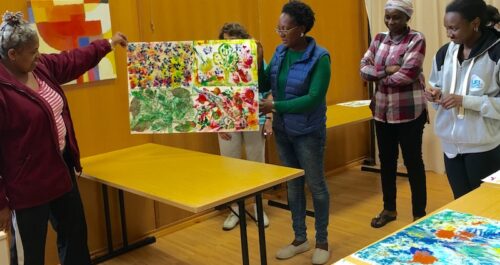

Alex Oma-Pius
INT: I’m with Alex of Iroko from Theatre, it’s the 10th May We are recording for the 30th anniversary of Rosetta Arts. Could you say your name?
AI: My name is Alex Oma-Pius.
INT: Please tell us where you were born and where you grew up?
AI: I was born in Nigeria; I grew up in Nigeria to the age of 18 before and moved over to Bulgaria. I did my university studies in Bulgaria.
INT: How long you been in London for?
AI: In London, about 32/ 33 years.
INT; Is that always in Newham?
AI: I’ve been in Newham since about 1997.
INT: How did you first find out about Rosetta?
AI: Well, you know, coincidentally, we used to run a summer school downstairs in the hall there. Thinking of it now, I don’t know how they actually coped with us because we used to do African drumming workshops during the summer school and we didn’t know there were offices. I do see Rosetta Arts you know; I’m talking about yeah early 2000s. That’s how I found out about Rosetta Arts – just working here.
INT: Can you tell me more about these classes they ran?
AI: Well, it was mainly for, you know, children are young people. It was at a time of Newham ran schemes. Every summer you have different activities. I’m sure even Rosetta Arts was running activities as well, but you know, so we will be teaching our African dance; Africa story-telling; African drumming for two weeks sessions. Yes, that was good. We used to do that every year until the funding ran out.
INT: That was just in the building?
AI: Rosetta had contracted us differently, you know in their activities within the community – using African drumming to engage to people, bringing people together, yes.
INT: What was the first project you worked on with Rosetta?
AI: Oh, I can’t remember the first one you know, but the last one I do was at the local park here in Plaistow when they, eh, when they had the Newham Unlocked Festival. Rosetta was leading on that and they got Iroko involved in that. And it was a big successful day.
INT: Can you describe the festival and the activities you led with us?
AI: The success of the festival was the ability to bring people from all backgrounds, you know, together, and that was in my opinion, because if you look out all the different activities that took place on that there was representation, you know, whether, whichever part of the world you were in you felt presented the festival and I’m sure you have wonderful pictures on videos to testify to these, not me saying what happened. Yeah, it’s bringing people together for us to be one Newham.
INT: Can you describe the day?
AI: Well, it was such a joyful day! I mean, he said that people you know puts all their troubles aside and just have fun. There was fun everywhere.
INT: Have you done African drumming again for Newham Unlocked?
AI: Yes, during this coronation. I mean the photographer was asking me now if I had a restful coronation weekend. Well, not at all because we were working. We had, you know, street parties, so some of the bookings we turn down because we can’t be everywhere at the same time. So, we were doing African drumming, you know, as part of the celebration we doing story-telling at East Ham library on the Saturday then Carpenters Estate in Plaistow you know yeah we just bringing people together with drums.
INT: Have you worked on any other previous project with Rosetta?
AI: Like I said – we have. I can’t remember the year. It’s not just working with Rosetta, Sanaz is on the board of a Newham Heritage Steering Committee, I am on the board as well, so from there always like exchange of ideas you know, all the things that Rosetta is doing through that forum, I am aware of what is happening in Rosetta which I admire really the work you are doing in with the local community well
INT: How do I describe Rosetta Arts and the work that we do?
AI: You know, that access, you know, providing access to people to the arts for people who would normally not access the art, the raining that you are providing. You are going into the community doing different types of arts activities. You know but educational learning and enjoyment as well in general. I’m sure you are involved it in health and well-being, you know, some sort of therapeutic art activities for people, so I mean that is wonderful that’s wonderful in that that’s what the community needs. You know, art is not supposed to be for the elite you know, so Rosetta in the community is providing this for, at all levels.
INT: And would you say Rosetta’s input in the community is necessary?
AI: Absolutely, otherwise how would they know what to not to access out how they access the arts if Rosetta is not there? That is very impactful, yeah, yes, I don’t need to go to the National Portrait to go and learn art, I can do that here in Newham with the Rosetta so that’s the impact.
INT: What would you like to see for the future of Rosetta Arts and the borough?
AI: I would like is like you know an academy or some sort of you know arts venue where you have people can imagine people who come to see Rosetta people can come and take part in Iroko workshops, whereas the storytelling ,or drumming, or dance all happening in one space a set of Heritage Centre you know where Iroko, Rosetta, maybe similar organisation will be based. It would be wonderful!

